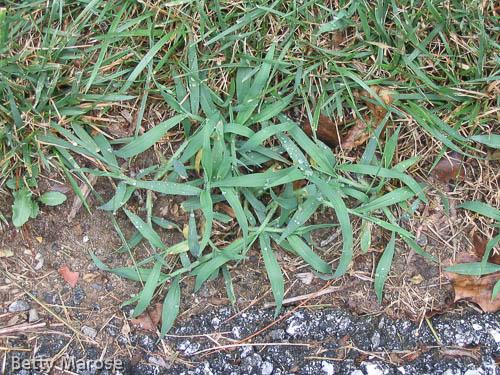Is corn gluten really effective in controlling lawn weeds before they germinate? Can I use it to prevent crabgrass and when is the recommended time to apply it?
Corn gluten (CG) is promoted as an organic substitute for conventional preemergent herbicides. CG is a by-product of the commercial corn milling process. However, it is not recommended by the University of Maryland Extension for weed control in lawns for three reasons:
- University research data shows mixed results regarding its effectiveness in preventing crabgrass. It is ineffective where weed pressure is high.
- CG is 10% nitrogen by weight. Some experts think that this large amount of nitrogen increases lush, dense growth which crowds out some weeds. But nitrogen is converted into nitrates which can move into surface and groundwater and eventually into the Bay. Also, spring nitrogen applications can increase turf susceptibility to lawn diseases like brown patch.
- The amount of the product needed to suppress weeds violates the Maryland Fertilizer Use Act of 2011 which states that no more than 0.9 lbs. of nitrogen per 1,000 sq. ft. can be applied to lawns at each application. According to some CG product directions, you should apply 20 lbs. per l,000 sq. ft. twice a year in spring and fall. Each application contains 2 lbs. of nitrogen. This is well over the per-application rate of 0.9 lbs. and exceeds the total yearly limit of 2.7 lbs. set by law.
Corn gluten products can be found on Maryland store shelves and are labeled as an organic fertilizer, an organic herbicide, or both. CG can be used as an organic fertilizer as long as the application rate is 0.9 lbs. of nitrogen per 1,000 sq. ft. and no more than three applications are made to your lawn per year.
Crabgrass can be a prominent summer lawn weed in Maryland. A thick, dense lawn is your best defense against weeds. Lawn weeds are opportunistic and fill in bare spots or areas where turf is thinning. Proper mowing, fertilizing and planting a good quality seed will reduce weed pressure. Use a standard preemergent lawn herbicide as a last resort.
Additional resources
Oregon State University Extension Service
Still have a question? Contact us at Ask Extension.
 English
English العربية
العربية Български
Български 简体中文
简体中文 繁體中文
繁體中文 Hrvatski
Hrvatski Čeština
Čeština Dansk
Dansk Nederlands
Nederlands Suomi
Suomi Français
Français Deutsch
Deutsch Ελληνικά
Ελληνικά हिन्दी
हिन्दी Italiano
Italiano 日本語
日本語 한국어
한국어 Norsk bokmål
Norsk bokmål Polski
Polski Português
Português Română
Română Русский
Русский Español
Español Svenska
Svenska Català
Català Filipino
Filipino עִבְרִית
עִבְרִית Bahasa Indonesia
Bahasa Indonesia Latviešu valoda
Latviešu valoda Lietuvių kalba
Lietuvių kalba Српски језик
Српски језик Slovenčina
Slovenčina Slovenščina
Slovenščina Українська
Українська Tiếng Việt
Tiếng Việt Shqip
Shqip Eesti
Eesti Galego
Galego Magyar
Magyar Maltese
Maltese ไทย
ไทย Türkçe
Türkçe فارسی
فارسی Afrikaans
Afrikaans Bahasa Melayu
Bahasa Melayu Kiswahili
Kiswahili Gaeilge
Gaeilge Cymraeg
Cymraeg Беларуская мова
Беларуская мова Íslenska
Íslenska Македонски јазик
Македонски јазик יידיש
יידיש Հայերեն
Հայերեն Azərbaycan dili
Azərbaycan dili Euskara
Euskara ქართული
ქართული Kreyol ayisyen
Kreyol ayisyen اردو
اردو বাংলা
বাংলা Bosanski
Bosanski Cebuano
Cebuano Esperanto
Esperanto ગુજરાતી
ગુજરાતી Harshen Hausa
Harshen Hausa Hmong
Hmong Igbo
Igbo Basa Jawa
Basa Jawa ಕನ್ನಡ
ಕನ್ನಡ ភាសាខ្មែរ
ភាសាខ្មែរ ພາສາລາວ
ພາສາລາວ Latin
Latin Te Reo Māori
Te Reo Māori मराठी
मराठी Монгол
Монгол नेपाली
नेपाली ਪੰਜਾਬੀ
ਪੰਜਾਬੀ Afsoomaali
Afsoomaali தமிழ்
தமிழ் తెలుగు
తెలుగు Yorùbá
Yorùbá Zulu
Zulu ဗမာစာ
ဗမာစာ Chichewa
Chichewa Қазақ тілі
Қазақ тілі Malagasy
Malagasy മലയാളം
മലയാളം සිංහල
සිංහල Sesotho
Sesotho Basa Sunda
Basa Sunda Тоҷикӣ
Тоҷикӣ O‘zbekcha
O‘zbekcha አማርኛ
አማርኛ Corsu
Corsu Ōlelo Hawaiʻi
Ōlelo Hawaiʻi كوردی
كوردی Кыргызча
Кыргызча Lëtzebuergesch
Lëtzebuergesch پښتو
پښتو Samoan
Samoan Gàidhlig
Gàidhlig Shona
Shona سنڌي
سنڌي Frysk
Frysk isiXhosa
isiXhosa